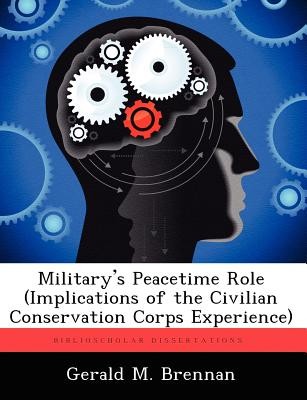
- We will send in 10–14 business days.
- Author: Gerald M Brennan
- Publisher: BiblioScholar
- ISBN-10: 1249372992
- ISBN-13: 9781249372998
- Format: 18.9 x 24.6 x 0.9 cm, softcover
- Language: English
- SAVE -10% with code: EXTRA
Military's Peacetime Role (Implications of the Civilian Conservation Corps Experience) (e-book) (used book) | bookbook.eu
Reviews
Description
This thesis evaluated the military's role in the Civilian Conservation Corps (CCC), 1933 1942. The purpose of the study was to determine the effects of the military's involvement in the CCC on national defense, on the economy and to deduce a net effect on national power. The study looked briefly at other well known peacetime ventures (Lewis and Clark Expedition, Panama Canal Project, air mail service) in which the military has been involved to see if there were comparable effects. An historical research methodology was used. Facts and expert opinion were gleaned from sources and evaluated to discern effects. The findings of this thesis were that the peacetime military's involvement in nation building and domestic service programs, especially the CCC, had predominantly positive effects on both the economic strength and the military strength of the nation, and that there was an interactive net positive effect on national power. In view of the positive impacts of the military's involvement in the CCC and other civilian-like pursuits, this study concluded that the military should have an enunciated dual purpose in peacetime: to provide for the common defense and to promote the general welfare. Finally, it was suggested that a "home-for-the-homeless training and public works program" and a "youth program" involving free technical education, paramilitary training and conservation work might serve the best interests of the nation today us the CCC did in the 1930s.
EXTRA 10 % discount with code: EXTRA
The promotion ends in 15d.21:06:24
The discount code is valid when purchasing from 10 €. Discounts do not stack.
- Author: Gerald M Brennan
- Publisher: BiblioScholar
- ISBN-10: 1249372992
- ISBN-13: 9781249372998
- Format: 18.9 x 24.6 x 0.9 cm, softcover
- Language: English English
This thesis evaluated the military's role in the Civilian Conservation Corps (CCC), 1933 1942. The purpose of the study was to determine the effects of the military's involvement in the CCC on national defense, on the economy and to deduce a net effect on national power. The study looked briefly at other well known peacetime ventures (Lewis and Clark Expedition, Panama Canal Project, air mail service) in which the military has been involved to see if there were comparable effects. An historical research methodology was used. Facts and expert opinion were gleaned from sources and evaluated to discern effects. The findings of this thesis were that the peacetime military's involvement in nation building and domestic service programs, especially the CCC, had predominantly positive effects on both the economic strength and the military strength of the nation, and that there was an interactive net positive effect on national power. In view of the positive impacts of the military's involvement in the CCC and other civilian-like pursuits, this study concluded that the military should have an enunciated dual purpose in peacetime: to provide for the common defense and to promote the general welfare. Finally, it was suggested that a "home-for-the-homeless training and public works program" and a "youth program" involving free technical education, paramilitary training and conservation work might serve the best interests of the nation today us the CCC did in the 1930s.


Reviews